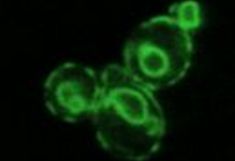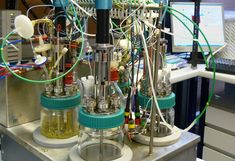Recombinant proteins are often produced using biotechnologically modified yeasts, with the protein yield increasing with yeast growth. This Christian Doppler (CD) laboratory is now looking for ways to decouple protein synthesis from yeast growth.
Since protein synthesis and secretion correlate with yeast growth, biomass must grow continuously to enable efficient product formation. However, high biomass concentrations achieved can lead to technical problems on a large scale during the production of proteins. A process that allows the efficient production of recombinant proteins by relatively low biomass concentrations would therefore be desirable, but is not yet technically possible.
The rate of yeast growth is mainly regulated by the nutrient supply. In order to be able to produce proteins in a predictable way even with low growth of yeast cultures, the knowledge of their living conditions and cell regulation mechanisms must be deepened in cases of extreme nutrient deficiency. For this purpose, the yeast Pichia pastoris will be cultivated in Retentostat cultures. Retentostat cultures are characterised by the fact that the nutrient medium is withdrawn from the biomass reactor until the amount of consumed nutrient medium just meets the nutritional requirements of the available biomass, but does not stimulate further growth. In this system, all characteristic metabolic properties of the yeast cell are to be analysed in order to draw conclusions about which metabolic pathways are active at which point in the cycle.
This basic knowledge forms the scientific basis for the prediction and development of novel genetically modified yeasts, so-called cell engineering strategies, which are able to decouple protein synthesis and secretion from growth. The genetically modified strains are then validated by cultivation under controlled conditions at very low specific growth rates. The aim is to demonstrate that protein synthesis and secretion have actually been decoupled from biomass formation.
The knowledge about growth and secretion processes established by the research of this CD laboratory opens up possibilities for the development of optimal production platforms and processes in the future.
Funding Organization

Commercial Partner




